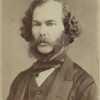
Scott C. Thompson, “On G. H. Lewes’s Problems of Life and Mind, 1874—79″
In Problems of Life and Mind (1874—79), George Henry Lewes posits his theory of “Scientific psychology,” which is founded on a synthesis between the objective study of the mind practiced in physiology and the subjective study of consciousness practiced in philosophy. Problems is an important text because it is one of the last quintessentially “Victorian” studies, a wide-ranging work produced before the full establishment of disciplinary boundaries. It combines a variety of discourses—including philosophy, physiology, psychology, evolutionary biology, and sociology—in order to establish a comprehensive methodology for the scientific study of consciousness. This entry positions Problems into its nineteenth-century psychological and philosophical tradition, as understood by Lewes; provides a summary of the overarching argument of Problems; and outlines the contributing sub-claims made in each of its discrete series.
